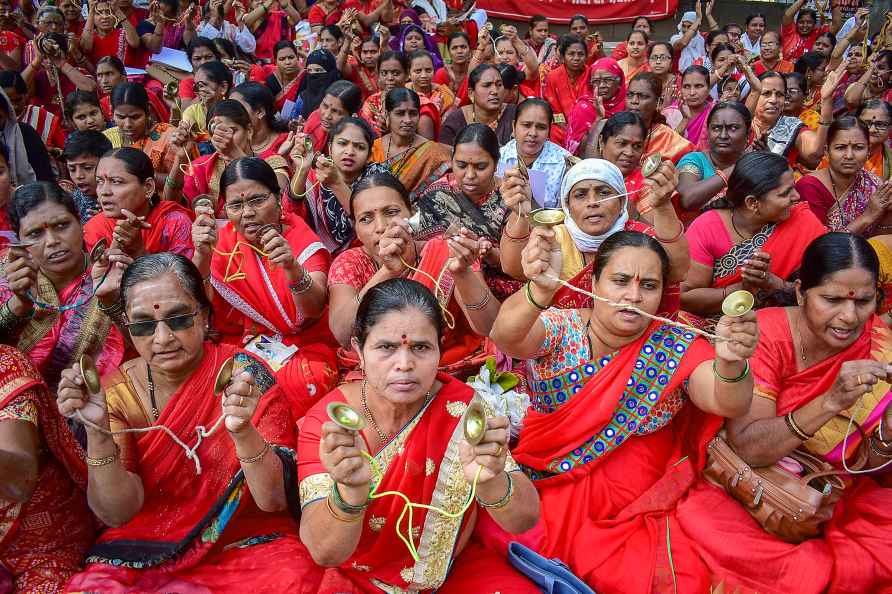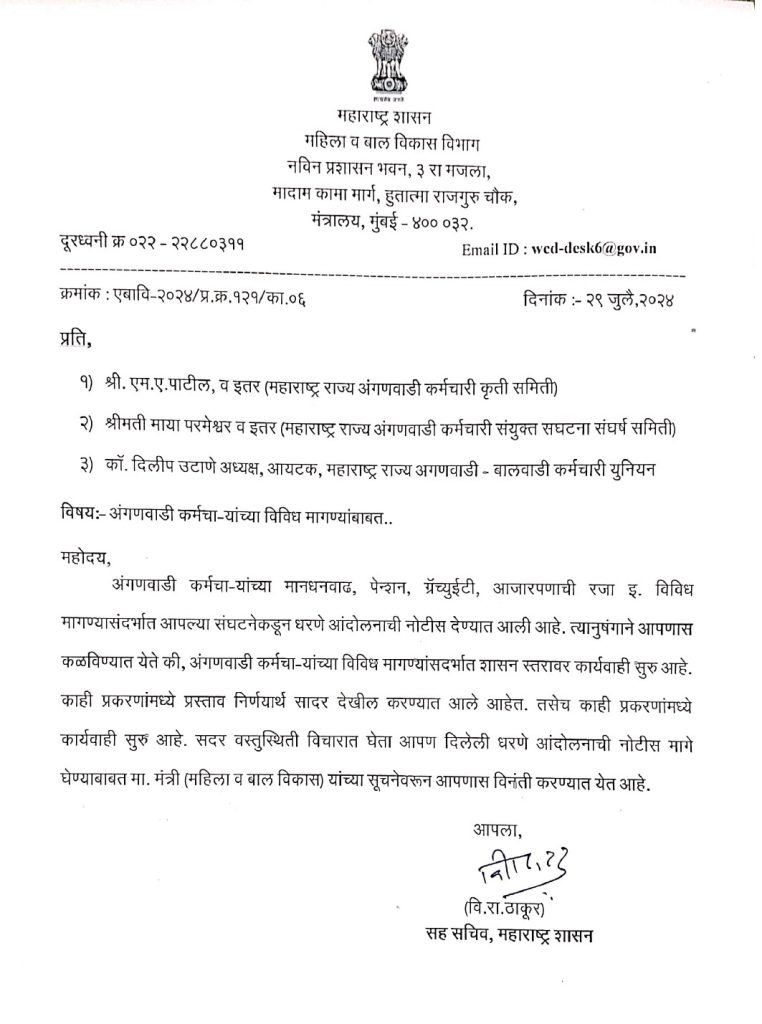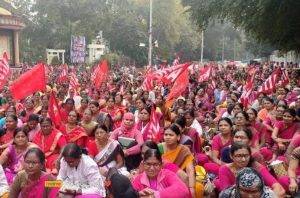‘Committed To Janata, Not Sarkar’: Protesting Anganwadi Workers In Maharashtra
With the state indifferent to their demands for better wages and their workload heavier by one more scheme, Anganwadi workers in Maharashtra are protesting again. But their resistance tactics have changed
- Priyanka Tupe

Anganwadi workers in Maharashtra have launched a statewide protest once again, reiterating their long unmet demands — increment in salary, provision of pension, gratuity and other social security benefits. But this time they have adopted a unique mode of protest – of civil disobedience and non-cooperation – while carrying on with their duties of community care.
Since July 15, the women have stopped submitting their mandatory monthly progress reports (MPR) to the government and are also boycotting official meetings and events. However, they have not allowed this to interrupt their essential care tasks such as providing cooked nutritious meals to pregnant women, children and lactating mothers, conducting various surveys and monitoring the health and wellbeing of beneficiaries.
“We are committed to the janata (people), not the sarkar (the government),” said Kamal*, an Anganwadi worker from Thane.
After a fortnight of non-cooperation, Anganwadi workers had planned to escalate their protest with a sit-in at Azad Maidan in Mumbai starting July 30. However, this was paused after a request from the state’s Women and Child Development (WCD) department. The WCD issued a request letter to the Maharashtra Rajya Anganwadi Karmachari Kruti Samiti (an umbrella body of seven unions of Anganwadi workers in Maharashtra) on the evening of July 29, asking that the scheduled protest be called off.

“We have called off the sit-in protest that was planned from July 30 in Mumbai after the request but our struggle continues in the districts where workers will continue with the civil disobedience,” MA Patil, convenor of the Maharashtra state Anganwadi Karmachari Kruti Samiti told Behanbox. The WCD department has assured the workers that negotiations are being conducted at different levels of the administration to meet the Anganwadi workers’ demands.
In most districts of Maharashtra, Anganwadi workers have been presenting their demand charter and grievances to the collectors and local WCD officials since July 15, but their voices are not being heard, activists told Behanbox.
Back in December 2023, over 20,000 Anganwadi workers had protested for 52 days at Azad Maidan in Mumbai, and had gone without pay for the period. They were met with disciplinary actions of arbitrary terminations, as we had reported earlier. Many Anganwadi workers at the time told us how the protests for their unmet demands were taking a toll on their physical, mental and financial health.
“We are literally surviving on loans. How many strikes can we go on?” said an Anganwadi worker who wishes to remain anonymous fearing retribution from the state. “The government tries to break our unity every time without fulfilling our demands,” she said.
The state government had promised to consider the demand for pensions as well as other demands in January 2024, and persuaded the protesting workers to call off the strike. The women workers are angry and disappointed at the state for not keeping up with the promises.
In Maharashtra 30,000 Anganwadi workers (1.35 million across India) look after the health, wellbeing and nutrition of women and children through the Integrated Child Development Services (ICDS). Jyoti Gaikwad, an Anganwadi worker from Naigaon village of Paithan in Chatrapati Sambhaji Nagar (formerly Aurangabad), described her workday thus:
“We conduct preschool for two hours, then spend an hour cleaning and distributing food – khichadi, lapasi, usal and so on. Then we have to conduct home visits for family surveys, vaccination, registration of births and deaths, and providing take-home rations to pregnant and breastfeeding women. We need to provide them with basic counselling and awareness about health and nutrition. We also need to provide rations at home to adolescent girls who have dropped out of school, provide them counselling and information about government schemes. We maintain 11 types of registers.”
In the last five years, Anganwadi workers in the state have protested several times with the same demands but they remain unmet. The women are demanding that they be designated as regular government employees, be paid better wages and granted benefits such as a steady pension, gratuity, provident fund, and health insurance. Currently, a worker (sevika) is paid Rs 10,500 a month and a helper, Rs 5,500. Once they retire they are given a lump sum – Rs 1 lakh to Anganwadi workers and Rs 75,000 to helpers.
Along with these demands, workers are also demanding new mobile phones to collate and record data related to their duties, better infrastructure for Anganwadis, more nutrition grant per beneficiary and timely recruitment to vacant positions. Behanbox had earlier reported about the exhausting workload Anganwadi workers have to deal with, especially since the digitisation of the data they collect through the POSHAN tracker app.
As Maharashtra goes to polls to elect a new state assembly and government, the Anganwadi workers are determined to show their power at the ballot box.
“I think voting out this government is the only option left with us. We’ll see them during assembly elections, ” said the Anganwadi worker.
New Workload, Old Demands
“What have we asked for? Pension which secures our post retirement lives, gratuity, increment. When we protested for 52 days last time, many of our colleges lost their pay, they are now surviving on loans but the government remains stubborn [about their demands]. It’s been five months since then, nothing has changed,” said Sangeeta Kamble, an Anganwadi worker from Mankhurd in eastern Mumbai.
Kamble, while participating in the current protest campaign, remains steadfast in her commitment to community work. She is helping women enrol in the Ladaki Bahin Yojana and serves cooked meals to children at her Anganwadi. The yojana is a new scheme launched in the interim budget session ahead of the assembly elections in the state, and it aims to help women from 21 to 65 years of age with financial assistance of Rs 1500 a month.
“We have been working till 11 pm these days, enrolling women for the Ladki Bahin Yojana while navigating the many technical issues the app is facing because we understand the pain of poor women who could benefit from this scheme. But who will understand our pain?” asked Kamble.
Anganwadi workers are using the ‘Narishakti Doot’ mobile app to enrol women for the Ladaki Bahin scheme and for this they have been assured an incentive of Rs 50 per beneficiary. But they have not received any communication from the government about when these payments will be made. Additionally, the workers have been left to their own devices without adequate training for using the app. This additional workload on Anganwadi workers is taking its toll: Surekha Aatkare, 48 an anganwadi worker from Degav village in Mohol taluka of Solapur, died by heart attack while working for Ladki Bahin Scheme on July 10, as per this TV9 Marathi report.
Getting the government to meet their long-standing demands is a Sisyphean effort, Anganwadi workers told us.
Daivshala Mapari, an Anganwadi worker from Gangakhed village in Parbhani district, is not sure the campaign will move the government into action. “We can only withhold offline reports. All data and records are available online with the government through the apps. So why would the government care about our protests and take us seriously?” she asked.
Mahdhuri Kshirsagar, a Parbhani-based human rights lawyer and acting president of the Maharashtra Rajya Anganwadi-Balwadi Karmachari Union, said the state’s indifference to the plight of the workers has become apparent after successive protests.
“This is our regular experience of various protests. The Supreme Court has said that Anganwadi workers are entitled to gratuity but the states are not complying with the order,” said Kshirsagar. While protests are an important tool for negotiating for their rights, they also stretch the financial, physical and mental capacities of women who are already saddled with enormous workload, exhaustion and above all retributive action from the state. The government, on the other hand, makes promises but does seem keen on solving the deadlock, she said.
“Continuing our struggle at the hyper local level while making our voices heard at the ballot box seems like the only option available to us,” said Kshirsagar.
We believe everyone deserves equal access to accurate news. Support from our readers enables us to keep our journalism open and free for everyone, all over the world.


